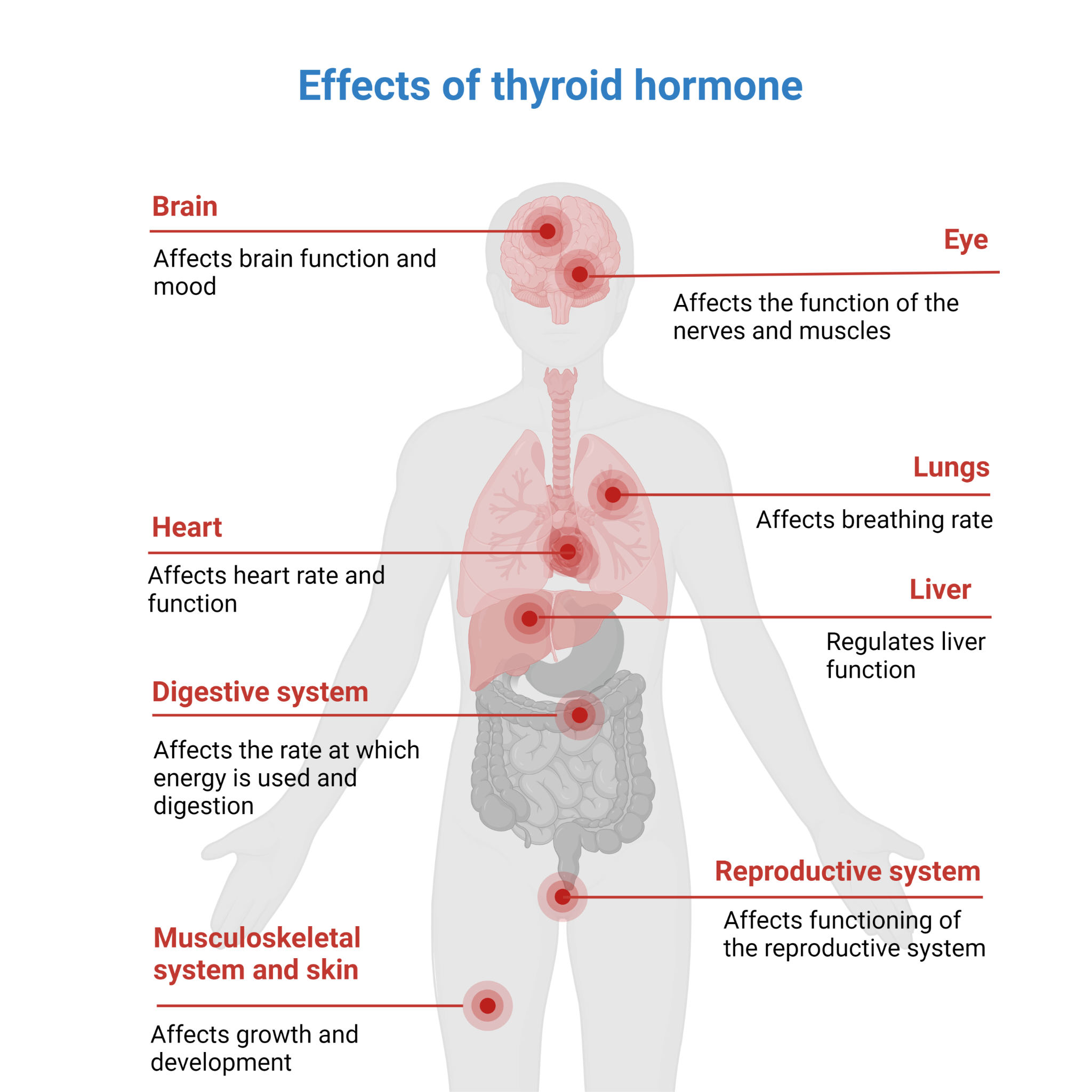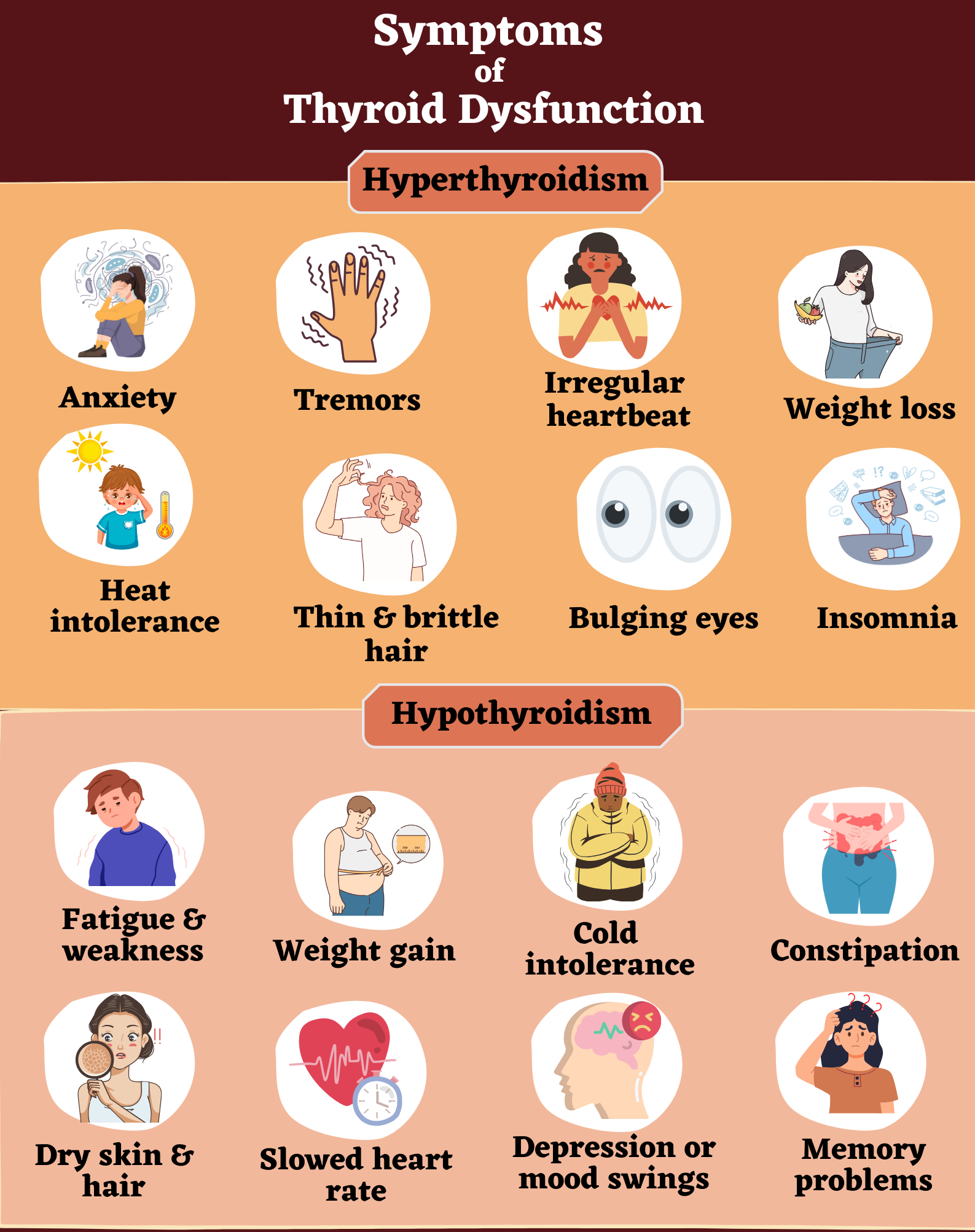Thyroid trouble: Proactive steps for prevention and protection
What is thyroid, why it is important
Thyroid is a small, butterfly-shaped gland located at the front of the neck under the skin. It is part
of the endocrine system and controls the speed of metabolism by producing and releasing (secreting)
hormones T3 and T4. Metabolism is the process of transforming food into energy. Hence, improper
functioning of the thyroid can impact the entire body.

Thyroid malfunction can be:
- Hypothyroidism (underactive thyroid): Does not produce and release enough thyroid
hormones.
- Hyperthyroidism (overactive thyroid): Produces and releases more thyroid hormones
than your body needs.
- Goitre: Enlargement of your thyroid gland.
- Thyroid cancer: Cancer that begins in your thyroid tissues.
The harm caused by thyroid malfunction
Malfunctions of the thyroid gland can lead to metabolic disturbances, weight changes, fatigue and
weakness, mood swings and depression, heart problems, menstrual irregularities, cognitive impairment,
eye and skin problems and autoimmune diseases like Grave disease (hyperthyroidism).
Harmful caused by thyroid malfunctions

Symptoms that indicate the presence of thyroid disease:
Hypothyroidism and hyperthyroidism have different symptoms. Older adults are more
likely to have
symptoms that are hard to notice, similar to the signs of other medical conditions. The symptoms
listed below can be associated with thyroid disorders for both hypothyroidism and hyperthyroidism.
- Swallowing and discomfort in front of the neck
- Slow or rapid heart rate and heart failure
- Unexplained weight loss or weight gain
- Difficulty tolerating cold or heat
- Vision changes and bulging eyes
- Memory issues such as depression or anxiety
- Irregular menstrual periods

Who is at risk of thyroid disease?
Thyroid diseases are common and can affect anyone at any age. The risk increases with:
- Personal or family history
- Being older than 60, especially if you are a woman
- Having autoimmune diseases such as rheumatoid arthritis, adrenal insufficiency, type 1 diabetes,
lupus or celiac disease
- Being pregnant
- Taking too much iodine intake or an iodine-containing medication (for example, amiodarone)
- Being deficient in vitamin D and selenium, and certain medications like lithium for bipolar
disorder
How is thyroid disease diagnosed?
A combination of physical examinations, blood tests and imaging tests are used to determine thyroid
problems.
- Medical history and physical examination include family history, swelling in the
neck (goitre),
changes in heart rate or abnormalities in the eyes.
- Imaging tests: Ultrasound imaging, scan and radioactive iodine uptake test to
identify thyroid
enlargement, atrophy or nodules.
- Blood tests are used to measure levels/ functioning of thyroid hormones T3 & T4:
- T3 (Triiodothyronine) test, assesses the level of thyroid hormone T3 in the
blood.
- (Thyroxine) test measuresT4 the level of thyroid hormone T4 in the blood.
- TSH (thyroid-stimulating hormone) test, regulates the production of thyroid
hormones (T4 and
T3). Elevated TSH levels may indicate an underactive thyroid (hypothyroidism), while low levels
may suggest an overactive thyroid (hyperthyroidism).
What is the treatment for thyroid:
There is no foolproof way to prevent thyroid disease. The best approach for treatment depends on the
age, underlying health condition and the severity and nature of thyroid disease. A combination of
medicines, surgery, lifestyle changes and dietary adjustments can effectively manage and reduce the
risk of severe complications.
- Anti-thyroid medicines stop your thyroid from making hormones.
- Radioactive iodine is taken orally; this damages the cells of the thyroid and prevents it from
producing high levels of thyroid hormones.
- Surgery to remove part or most of the thyroid gland (thyroidectomy) is done in rare cases. Since
the removal will stop the hormone production, thyroid replacement hormones or medicines will be
required for your entire life.
To maintain a healthy thyroid balance ensure the following:
- Monitor iodine intake through blood tests as excess or deficiency can worsen
thyroid health.
- Avoid eating foods that could inflame thyroid disease such as soya-rich, cabbage,
spinach,
cauliflowers, pine nuts, pearl millet, peanuts, caffeine-rich products, butter, red meat, fried
food, vitamins or herbal supplements.
- Eat a balanced diet rich in fruits, vegetables, whole grains and lean proteins to
support your
health.
- Stay physically active with regular exercise and incorporate stress-reducing
techniques like
meditation or yoga to regulate metabolism and manage stress.
- Maintain a healthy weight.
- Protect your eyes from the sun and wind, especially if you have Graves' disease
(Hyperthyroidism).
Keep eyes lubricated and wear sunglasses when exposed to sunlight.
- Get adequate sleep of 7-9 hours per night.
- Limit consumption of caffeine and stimulants as excessive intake can
disrupt thyroid hormone
balance and worsen symptoms such as nervousness or heart palpitation.
By adopting these changes you can live a healthy life despite thyroid disease. Regular monitoring of
thyroid function is important to ensure that hormone levels are within the optimal range. This allows
healthcare providers to adjust medication dosages as needed and detect any changes or complications
early. Do not miss or adjust medicines by yourself.



